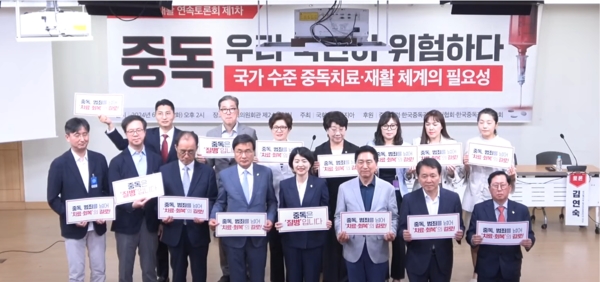Politicians and medical professionals have agreed on the need to enact the tentatively titled “Addiction Treatment and Recovery Support Act” to solve the problem of addiction, including drugs, gambling, and alcohol.
The proposed law aims to recognize “addiction” as a treatable disease and establish an interagency treatment and rehabilitation system that goes beyond punishing addicts and helps them return to society.

On Tuesday, Rep. Han Ji-a of the ruling People Power Party (PPP) held the first in a series of debates on addiction treatment and rehabilitation at the National Assembly Hall in Seoul, titled “Addiction Endangers the Public: Need for National Addiction Treatment and Rehabilitation System.”
"The number of people who are addicted to drugs by others is increasing, and the age of first encountering online gambling has dropped to 11.3 years old," Rep. Han said. "In this situation, we still view addicts as criminals and avoid rehabilitation facilities for addicts as hateful and dangerous facilities, rather than building infrastructure to help them return to society."
"Addiction is a disease," she said. “A rehabilitation system that can overcome addiction must work, and the state must provide the foundation for that system."
The PPP legislator then pledged to introduce the Addiction Treatment and Recovery Support Act.
The panel discussed the current state of the growing problem of addiction, including drugs, alcohol, and gambling, and how to build infrastructure and human resources to address these problems.
"Although addiction is a treatable 'disease' caused by damage to the brain's natural compensatory functions, the development of disease treatment technologies and the establishment of treatment and rehabilitation infrastructure and support at the Ministry of Health and Welfare for addiction are still very weak," said Professor Lee Hae-kook of the Department of Psychiatry at the Catholic University of Korea School of Medicine, who delivered the keynote presentation.
According to Lee, the number of people treated for gambling nearly tripled from 27 teenagers in 2017 to 78 in 2022 on an outpatient basis, and from 315 to 758 in their 20s. Drug addiction skyrocketed from 31 to 513 in teens and nearly doubled from 931 to 1,480 in 20-somethings, including outpatients and inpatients.
"The Covid-19 pandemic has exacerbated the level of problematic drug and gambling addiction, especially among teens and 20-somethings," Professor Lee said. "Public intervention is necessary because the damage of addiction inflicts the public but the addiction treatment gets low priority in the private sector," he said. “It is necessary to enact the ‘Addiction Treatment and Recovery Support Act’ as a fundamental solution to support addiction treatment and rehabilitation as a disease."
Lee Na-rae, head of the rehabilitation department at Incheon Chamsarang Hospital, which runs a treatment program for juvenile drug offenders, warned of the dangers of drug addiction among adolescents.
"When adolescents become addicted to drugs, serious brain damage occurs in a shorter time and at a lower dose than adults," she said. "Damage to the frontal lobe, which controls emotions, leads to depression, anxiety, and impulsive mood swings, as well as cognitive decline, such as difficulty concentrating."
"Adolescents are often accompanied by various other problems, including family and academic problems, as well as psychiatric ones, so there are limitations to treatment services within the current medical fee system," Lee said. "Within the legal system, it is necessary to establish a specialized addiction treatment and rehabilitation system in cooperation with other ministries and a control tower to operate it."
The government also echoed the concerns and points raised by academics and the field.
"We recognize the seriousness of the addiction problem," said Kim Yeon-sook, director of the Mental Health Management Division at the Ministry of Health and Welfare. "Addiction accompanies mental and physical illnesses, reducing the quality of life of individuals and causing great social losses, so it must be addressed in the public sector."
Kim added that the Ministry of Health and Welfare will address addiction within the healthcare system by including addiction in the mental health policy agenda, and will move toward treatment and rehabilitation in the community."
"Addiction-related policies are dispersed among ministries, so we are trying to pursue uniformity," she said. "To improve its exclusion from health insurance for those subject to addiction treatment and protection, the government will revise the relevant notification and apply it from August while reviewing and discussing raising medical fees for addiction treatment."
Related articles
- Nu Eyne to develop electroceutical to treat substance use disorders
- [Contribution] How to protect children from tobacco industry
- Internet gaming disorder can be treated with electroceutical therapy: study
- Vivozon Group teams up with Boryung to commercialize non-narcotic painkiller in Korea
- MFDS set to control narcotics efficiently through risk management plan

